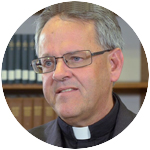
Father Thomas Dailey, O.S.F.S.
By now the Christmas decorations have been put away. But I still await one present — a new book coming from across the pond.
I look forward to reading “What is man?” — not only because I am one, but because assumptions in answer of that question lie at the base of virtually every debate in society today (and, for that matter, in any day).
“What is man? An Itinerary of Biblical Anthropology” is a book-length study by the Pontifical Biblical Commission. Published in Italian last December, the four-chapter report, according to the commission’s secretary, “is not intended to give answers to every possible question, but to provide foundational principles ‘for a discernment of the sense of man in history’.”
Discerning that sense continues to be a challenge. Reproductive technologies, biomedical advances, artificial intelligences, along with globalized economies and ecological catastrophes — these and other contemporary developments raise again the fundamental question the commission attempts to answer.
[hotblock]
Not surprisingly, the new book has already received harsh reviews, as, for example, the one that characterizes it as a “trojan horse” and labels it “the latest outrage by misguided churchmen.” The vehemence of such criticism appears to be singularly focused on the nine-page section on the Bible’s treatment of homosexuality.
I suspect there is a misreading based on selective quotations that fail to appreciate the full context and intended purpose of the report. But it would be a further mistake on my part to defend the book or critique its critics before actually reading the complete text!
Instead, let me pose an answer to the question from another angle and another time. Actually, this one comes from a saint whose feast we celebrate this month: Francis de Sales (1567-1622).
In his magisterial “Treatise on the Love of God,” the doctor of the church maps out an itinerary of human life that begins and ends with God. And the GPS for this journey is the human heart.
As did humanist philosophers before him, Francis de Sales sees in our hearts the central axis of human life, the distinguishing element that sets us apart from the rest of creation. For him, the heart is home not only to our emotions (the passions) but also to our reasoning and our decision-making. These coalesce in the movement of our heart toward what we consider worthwhile in life: we enjoy doing what we like and are happiest when we do what we love.
[tower]
But as a Christian humanist, Francis recognized that the human heart opens the way to much more when it comes to figuring out what is man.
We know from experience that our hearts (really, our whole selves) seek happiness. As rational creatures, that inclination steers us toward a “meaningful” or “purposeful” life.
But our journey comes to no end in this life. As St. Augustine famously put it, we live a “restless” existence.
For Francis de Sales, the “inner anxiety and constant unrest” that comes from man’s search for meaning should be understood positively. It discloses the spiritual dimension unique to being human, because it opens us up to a sense of the transcendent, a sense of something absolute that points us beyond ourselves. Put simply: it gives us a sense of God, who alone can fulfill the longings of the human heart.
In Salesian thought, this is what the biblical anthropology signifies by its affirmation that human beings are created in the “image and likeness” of God. What is man? The one created by God and for God. The one whose heart ultimately seeks God. The one whose longings are fulfilled when the human is united with the divine.
In his “Treatise” (book 10, chapter 1), Francis de Sales summarizes this anthropological itinerary in poetic terms that describe the ascent of all human life: “Man is the perfection of the universe; the spirit is the perfection of man; love, that of the spirit; and charity, that of love. For this reason, love of God is the end, the perfection, and the excellence of the universe.”
That excellence comes to perfection in the love of the Sacred Heart of Jesus. Fully human and fully divine, his heart is made flesh at Christmas, is pierced open for us on Good Friday, and comes alive eternally at Easter.
In this jubilee year celebrating the centenary of the canonization of St. Margaret Mary Alacoque, the “Apostle of the Sacred Heart,” we are invited to look there again to find the best answer to the question of what man is.
In the meantime, I’ll still be looking for my book!
* * *
Father Dailey is the John Cardinal Foley Chair of Homiletics and Social Communications at St. Charles Borromeo Seminary, Wynnewood, and a research fellow for the Catholic Leadership Institute in Wayne.
PREVIOUS: Each sip or shower echoes our Christian baptism
NEXT: Choosing a life with children, not of gold


Share this story